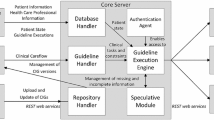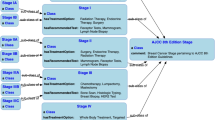Abstract
Guidelines, care pathways, and other representations of high quality clinical practice can now be formalized and distributed in executable form. It is widely recognized that the ability to apply knowledge at the point of care creates an opportunity to influence clinicians’ behavior, encouraging compliance with evidence-based standards and improving care quality. The ability to share formal knowledge may also enable the medical community to build on work done by others and reduce content development costs. We propose a Medical Knowledge Repository and content model that supports assembly of components into new applications. Some types of resources that may be included in such a repository are defined, and a frame-based representation for indexing and structuring the components is described. The domain of breast cancer is used as a case study for demonstrating the feasibility of the approach.
Preview
Unable to display preview. Download preview PDF.
Similar content being viewed by others
References
Shea, S., DuMouchel, W., Bahamonde, L.: A Meta-analysis of 16 Randomized Controlled Trials to Evaluate Computer-based Clinical Reminder Systems for Preventative Care in the Ambulatory Setting. J Am Med Inform Assoc 3(6), 399–409 (1996)
Peleg, M., Boxwala, A.A., Tu, S., Zeng, Q., Ogunyemi, O., Wang, D., et al.: The InterMed Approach to Sharable Computer-interpretable Guidelines:A Review. J Am Med Inform Assoc 11(1), 1–10 (2004)
Peleg, M., Tu, S.W., Bury, J., Ciccarese, P., Fox, J., Greenes, R.A., et al.: Comparing Computer-Interpretable Guideline Models: A Case-Study Approach. J Am Med Inform Assoc 10(1), 52–68 (2003)
Siegel, J.: CORBA 3 Fundamentals and Programming. 2nd edn. John Wiley & Sons, Chichester (2000)
Champion, M., Ferris, C., Newcomer, E., Orchard, D. (eds.): W3C. Web Services Architecture. W3C, November 14 (2002), http://www.w3.org/TR/2002/WD-ws-arch-20021114/
Domingue, J., Cabral, L., Hakimpour, F., Sell, D., Motta, E.: III: A Platform and Infrastructure for Creating WSMO-based Semantic Web Services. In: Proc. Workshop on WSMO Implementations 2004 (2004)
Clercq, P.A., Blom, J.A., Korsten, H.H., Hasman, A.: Approaches for creating computer-interpretable guidelines that facilitate decision support. Artif Intell Med 31(1), 1–27 (2004)
Fox, J., Alabassi, A., Black, E., Hurt, C., Rose, T.: Modelling Clinical Goals: a Corpus of Example and a Tentative Ontology. In: Proc. Symp. Comput. Guidelines and Protocols, pp. 31–45 (2004)
Fox, J., Alabassi, A., Patkar, V., Rose, T., Black, E.: An ontological approach to modelling tasks and goals. Comput. in Biol & Med. (2004) (in press)
Bernstam, E., Ash, N., Peleg, M., Tu, S., Boxwala, A.A., Mork, P., et al.: Guideline classification to assist modeling, authoring, implementation and retrieval. In: Proc. AMIA Symp. 2000, pp. 66–70 (2000)
Author information
Authors and Affiliations
Editor information
Editors and Affiliations
Rights and permissions
Copyright information
© 2005 Springer-Verlag Berlin Heidelberg
About this paper
Cite this paper
Peleg, M., Steele, R., Thomson, R., Patkar, V., Rose, T., Fox, J. (2005). Open-Source Publishing of Medical Knowledge for Creation of Computer-Interpretable Guidelines. In: Miksch, S., Hunter, J., Keravnou, E.T. (eds) Artificial Intelligence in Medicine. AIME 2005. Lecture Notes in Computer Science(), vol 3581. Springer, Berlin, Heidelberg. https://doi.org/10.1007/11527770_23
Download citation
DOI: https://doi.org/10.1007/11527770_23
Publisher Name: Springer, Berlin, Heidelberg
Print ISBN: 978-3-540-27831-3
Online ISBN: 978-3-540-31884-2
eBook Packages: Computer ScienceComputer Science (R0)




